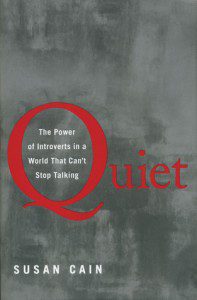 I’m a total introvert. My wife – in fact, the rest of my family – is not. I work most days in an office by myself in the corner of our house, carved out of a part of the old garage. I write, think, read and I have to say I’m pretty damn happy doing it most days.
I’m a total introvert. My wife – in fact, the rest of my family – is not. I work most days in an office by myself in the corner of our house, carved out of a part of the old garage. I write, think, read and I have to say I’m pretty damn happy doing it most days.
In fact, I’m typing this by myself in that very office, with a cup of tea, no less. How much of a stereotype can a guy be?
For some people, it is hard to imagine that I’m a keep-to-myself kind of guy. After all, I’m a somewhat public figure, and I love speaking to large groups of people. But for some introverts, it’s not people in and of themselves that pose the most daunting challenge; it’s fighting for air in a muddled conversation exerting ourselves to create the necessary space we need. We’d rather just accede the territory and move on to quieter frontiers, thanks very much.
In her New York Times Bestseller, “QUIET: The Power of Introverts in a World That Can’t Stop Talking,” author Susan Cain takes a thoughtful look at what, if any space we reserved, silent types can or should fill in a universe increasingly occupied by the din of white noise. Is anyone listening to anyone else? Is there even a point in adding to the conversation? Do we introverts have anything of value to contribute to a society that values self-promotion, bold claims and celebrity as virtues?
According to Cain, not only do we have something to offer; the world needs us more than it may realize.
Like social theorist and author Malcolm Gladwell, Susan Cain is adept at weaving together social inquiry with readable, relatable anecdotes and hard-nosed research. She tracks the trail of the alpha personality to see how it is that we came to a point where aggression and extroversion are assumed traits of any good leader. More than this, she considers what the effects of this may be on the culture, from alienating entire ethnic groups to stifling innovation.

But QUIET isn’t simply a manifesto in praise of the oft-marginalized introvert. Instead, Cain offers real-world examples of how both introverts and extrovert might communicate together better, all with the intent of cultivating a richer social, economic and corporate culture. She loves our more outspoken brothers and sisters. She just recognizes that they need us, as we need them.
Quiet is a valuable read both for those curious about the dynamics of human behavior and social interaction, as well as those seeking new ways to manage organizations more efficiently and effectively. Certainly, the silent bookworms of the world are not staging a coup; we’d rather read than rule the world. But we do have something to say, even if it’s tentative or halting in its delivery.
I suppose the only real concern I have is if Cain isn’t preaching to the choir to some degree with her important work. Yes, there is plenty for introverts to glean from the pages of QUIET, but the more outspoken and assertive among us certainly have more learning opportunities here. The question is: will they slow down and shut up long enough to read it?
Just kidding. Sort of.











